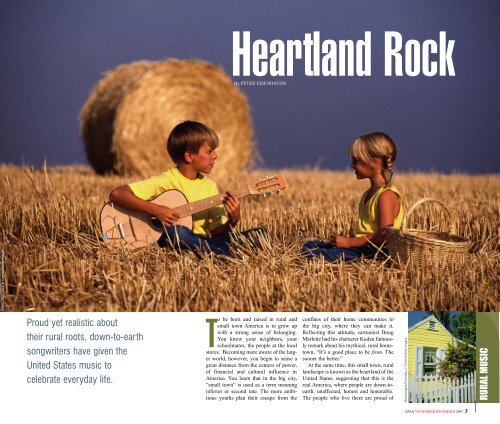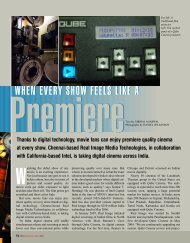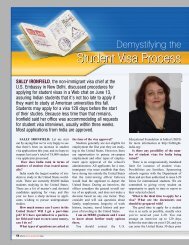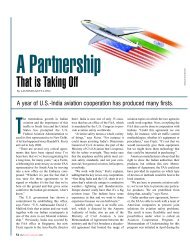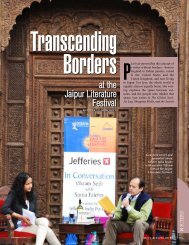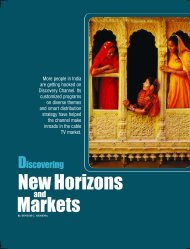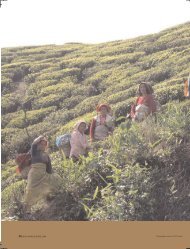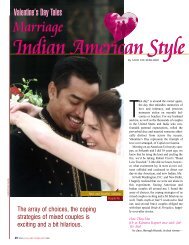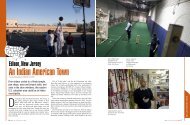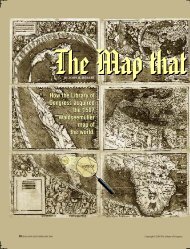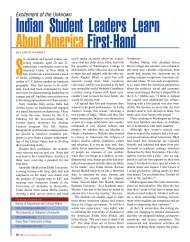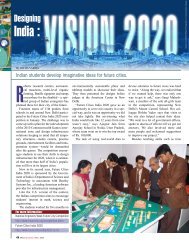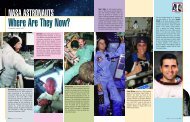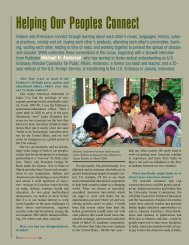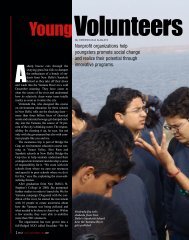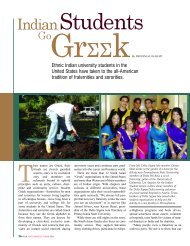Heartland Rock, SPAN November/December 2007
Heartland Rock, SPAN November/December 2007
Heartland Rock, SPAN November/December 2007
Create successful ePaper yourself
Turn your PDF publications into a flip-book with our unique Google optimized e-Paper software.
DAVID DE LOSSY © Creative/Getty Images<br />
Proud yet realistic about<br />
their rural roots, down-to-earth<br />
songwriters have given the<br />
United States music to<br />
celebrate everyday life.<br />
<strong>Heartland</strong> <strong>Rock</strong><br />
By PETER EISENHAUER<br />
To be born and raised in rural and<br />
small town America is to grow up<br />
with a strong sense of belonging.<br />
You know your neighbors, your<br />
schoolmates, the people at the local<br />
stores. Becoming more aware of the larger<br />
world, however, you begin to sense a<br />
great distance from the centers of power,<br />
of financial and cultural influence in<br />
America. You learn that in the big city,<br />
“small town” is used as a term meaning<br />
inferior or second rate. The more ambitious<br />
youths plan their escape from the<br />
confines of their home communities to<br />
the big city, where they can make it.<br />
Reflecting this attitude, cartoonist Doug<br />
Marlette had his character Kudzu famously<br />
remark about his mythical, rural hometown,<br />
“It’s a good place to be from. The<br />
sooner the better.”<br />
At the same time, this small town, rural<br />
landscape is known as the heartland of the<br />
United States, suggesting that this is the<br />
real America, where people are down-toearth,<br />
unaffected, honest and honorable.<br />
The people who live there are proud of<br />
Medioimages/Photodisc © Creative/Getty Images<br />
<strong>SPAN</strong> NOVEMBER/DECEMBER <strong>2007</strong> 3<br />
RURAL MUSIC
Born in the <strong>Heartland</strong><br />
Growing up in a small town in the Midwest meant playing every summer<br />
day outdoors, coming in after dark only when your mother called for you. It<br />
meant snowball fights and making snowmen in the winter. In the fall, it meant<br />
raking leaves all day into piles and then running and jumping in them. And in<br />
the spring, it meant waiting for the last huge chunk of ice to melt on the driveway<br />
under the basketball hoop so you would not fall down playing “horse!”<br />
It meant running through backyards with no fences, riding your bike everywhere<br />
in town, your dog following you to school and waiting for you when you<br />
got out. It meant family picnics in the field at the old Mulford farm, throwing<br />
dirt balls into the stream and standing barefoot in the ice cold spring water<br />
where the watercress grew.<br />
It meant doing everything as a family, from eating meals together to shoveling<br />
snow, from playing baseball to spring-cleaning the house, from taking<br />
family vacations in northern Wisconsin to replacing the storm windows with<br />
screens in summer.<br />
It meant hard work and happiness, but most of all, it meant freedom.<br />
—Ambassador David C. Mulford, born in <strong>Rock</strong>ford, Illinois<br />
this, even as they experience difficulties<br />
and frustrations.<br />
Many of these feelings found expression<br />
in a style of rock music that emerged<br />
in the late 1970s. In contrast to many of<br />
the popular groups of the era, the artists<br />
who played “heartland rock” were not<br />
theatrical. Instead of elaborate stage-sets<br />
and costumes, they came out in T-shirts<br />
and jeans; instead of synthesizers and programmed<br />
electronic percussion, they<br />
brought out guitars and backed up their<br />
songs with a strong beat from a traditional<br />
rock drum kit. In their personal lives,<br />
too, these artists tended to stay or return to<br />
their home communities, rather than living<br />
a glamorous lifestyle in New York or<br />
Los Angeles.<br />
According to the All Music Guide<br />
(www.allmusic.com/), a database of<br />
music, “At its core, heartland rock was<br />
straightforward rock ’n’ roll infused with<br />
Americana—more streamlined than garage<br />
rock, but not as traditionalist as roots<br />
rock.”<br />
The All Music Guide also notes that<br />
work in this style, “was united by the<br />
attitude that music should be about<br />
something.”<br />
What it is about is the lives, dreams and<br />
disappointments of ordinary working people,<br />
usually those in rural areas. An entry<br />
Willie Nelson (left) and Neil Young at the<br />
21st annual Farm Aid concert in Camden,<br />
New Jersey, in 2006.<br />
4 <strong>SPAN</strong> NOVEMBER/DECEMBER <strong>2007</strong><br />
PAUL NATKIN/Photo Reserve Inc. 2006<br />
in the online encyclopedia Wikipedia says<br />
the theme of isolation is central to heartland<br />
rock.<br />
This can be seen in the songs of the<br />
most prominent rockers in this style:<br />
Bruce Springsteen, Tom Petty, John<br />
Mellencamp and Bob Seger. Many of<br />
Springsteen’s songs, like “Promised<br />
Land,” speak bitterly of the broken promise<br />
of America. His song “Born in the<br />
U.S.A.” has a refrain that sounds like a<br />
proud patriotic anthem. Yet, the verses<br />
describe the pain of a returned war veteran<br />
finding it hard to make his way in life<br />
back home. In “Night Moves,” Bob Seger<br />
sings of the yearning of young lovers and<br />
romantic encounters “out past the corn<br />
Ambassador David C. Mulford and his wife,<br />
Jeannie, at Roosevelt House with their silkscreen<br />
color print by Italian artist Nicola<br />
Simbari. It depicts a typical American<br />
Midwest scene—a young girl riding her bike<br />
in the backyard, with sheets drying on the<br />
clothesline. The Ambassador says the picture<br />
makes him think of his wife as a child<br />
growing up in the small town of Hastings in<br />
Nebraska.<br />
fields where the woods get heavy.” “Look<br />
at the stars,” he sings in another song,<br />
“they’re so far away.”<br />
Mellencamp was born in the state of<br />
Indiana in a town called Seymour. It was<br />
founded in the mid-1800s at the intersection<br />
of two railroads on the Great Plains.<br />
Hemant Bhatnagar
Mellencamp began his career with a<br />
local band, then got an opportunity to<br />
make it big time in 1976, when he was<br />
signed to a recording deal by the manager<br />
of British singer David Bowie—the artist<br />
who personified stagey “glam rock.”<br />
Mellencamp was given the name “Johnny<br />
Cougar” and an image reminiscent of the<br />
film star James Dean. The strategy did not<br />
work, and Mellencamp returned to<br />
Indiana, began recording albums of his<br />
own compositions and toured incessantly<br />
with his band. In 1982, his album<br />
“American Fool” topped the charts. The<br />
album included the hit single “Jack &<br />
Diane,” about “two American kids, from<br />
the heartland,” dreaming the dreams of<br />
youth: “Jack, he’s going to be a football<br />
star....” When Jack says “we ought to run<br />
off to the city,” Diane says, “You ain’t<br />
missing a thing.” The song’s refrain warns<br />
that “life goes on, long after the thrill of<br />
living is gone.”<br />
Mellencamp uses scenes from his<br />
hometown of Seymour in the video version<br />
of the song “Small Town” from his<br />
1985 album, “Scarecrow.” (http://www.<br />
youtube.com/watch?v=3eDkAG<br />
3R0h8). “Small Town” is a somewhat<br />
ironic celebration of the heartland:<br />
All my friends are so small town.<br />
My parents live in the same small town.<br />
My job is so small town,<br />
Provides little opportunity.<br />
Not that the singer himself can’t make it<br />
in the big city—he can—after all, he has<br />
“married an L.A. doll,” but brought her<br />
back from Los Angeles to be “small-town,<br />
just like me.”<br />
The video opens with a series of photos<br />
in black and white—an older couple<br />
proudly sitting out on their land. The main<br />
street of the town with the first automobiles,<br />
family portraits of farmers, young<br />
men in army uniform, a young couple outside<br />
a newly purchased house, then home<br />
movies of children playing, photos of<br />
Mellencamp himself playing ball, posing<br />
with his first rock band, relaxing with<br />
friends and family at home in modest surroundings.<br />
There’s a nostalgic feeling to<br />
all the photos—particularly the brick<br />
facades of the main street shops, built in<br />
the first flush of the prosperity of<br />
Seymour. Downtowns of communities<br />
John Mellencamp sings “Small<br />
Town” before a football game in<br />
Indianapolis, capital of his home<br />
state, Indiana, in September,<br />
<strong>2007</strong>.<br />
like Seymour, while often still<br />
well-maintained, are now often<br />
abandoned for the shopping<br />
malls that have grown up on the<br />
outskirts of the towns.<br />
Responding to the economic<br />
stresses on farmers and small<br />
communities, Mellencamp joined<br />
with Neil Young and country and<br />
rock singer Willie Nelson in 1985<br />
to found FarmAid (www.far<br />
maid.org/), a non-profit organization<br />
whose mission is to keep<br />
family farmers on their land.<br />
The plan was to hold just one<br />
concert, distribute aid, raise<br />
awareness and see success. Two<br />
decades later, however, the United<br />
States is still losing hundreds of<br />
family farms, and small towns are<br />
losing their young to the big cities,<br />
so Farm Aid holds concerts<br />
almost every year. It raises money<br />
to connect farmers to credit and<br />
information and promotes the value of<br />
wholesome food grown on family plots.<br />
“There is an on-going need for the kinds<br />
of help Farm Aid provides,” Mellencamp<br />
told reporters before a 2001 concert in his<br />
home state, Indiana. We all see what’s happening<br />
with agriculture, what’s happening<br />
to our small towns. They are going out of<br />
business.”<br />
But the love of the dream is still there.<br />
According to author Timothy E. Scheurer,<br />
in his book “Born in the U.S.A.—The<br />
Myth of America in Popular Music<br />
from Colonial Times to the Present,”<br />
Mellencamp, Springsteen and others have<br />
“alluded to the small town of the past as a<br />
place where community, people, freedom<br />
and opportunity still can be found.” As<br />
Mellencamp sings:<br />
No I cannot forget where it is that I come from.<br />
I cannot forget the people<br />
who love me.<br />
Yeah, I can be myself here<br />
in this small town.<br />
And people let me be just<br />
what I want to be.<br />
Scheurer notes that the songwriters may<br />
be “calling for a return to a condition<br />
which can never be, if it ever was.” Still,<br />
the “myth of America,” Scheurer writes, is<br />
“a deathless song….It haunts us, it<br />
inspires our anger, our hope, our distrust,<br />
our longing, our greatness and our<br />
shame….This is a country where everyone<br />
should enjoy the blessings of freedom,<br />
equality and opportunity; this is a<br />
country blessed with a bountiful natural<br />
landscape; and this is a country that needs<br />
to continue the quest to find itself, to find<br />
a true moral vision, to fulfill its revolutionary<br />
destiny, and to be a place where it<br />
really means something when we sing<br />
“Born in the U.S.A.”<br />
Please share your views on this article. Write<br />
to editorspan@state.gov<br />
5<br />
A.J. MAST © AP-WWP<br />
Peter Eisenhauer, the first<br />
secretary for cultural affairs at<br />
the U.S. Embassy in New Delhi,<br />
is from West Bend, a small town<br />
in Wisconsin. He has also<br />
played in rock bands.


